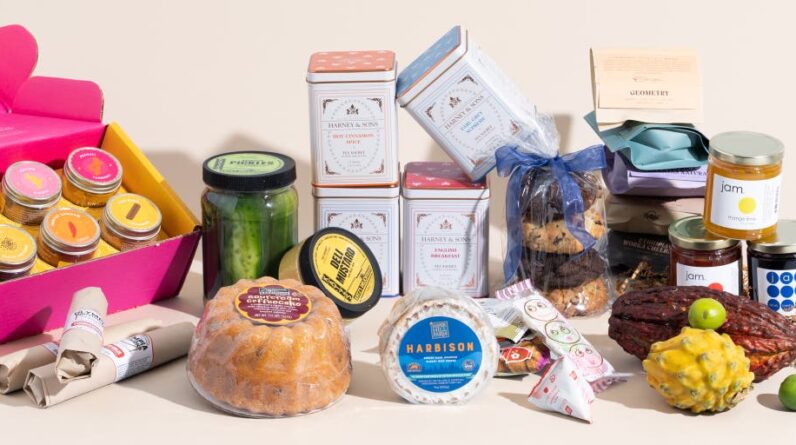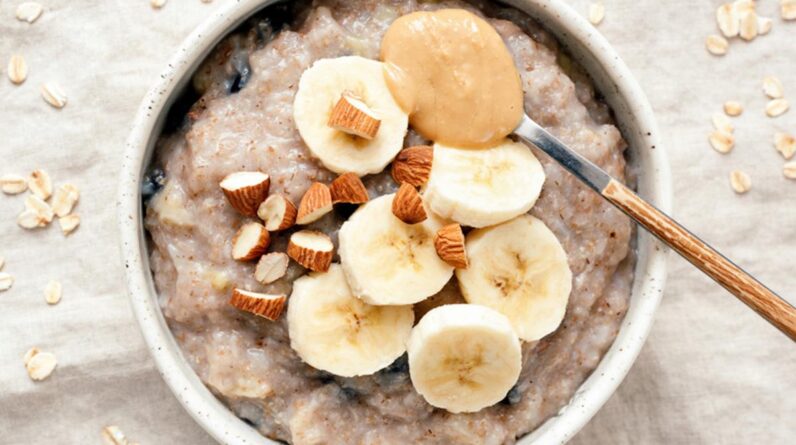
Tubers And Dried Fruit Month celebrates tubers and dried fruits’ versatility and nutritional benefits. It is a time to embrace these healthy food options and discover new ways to incorporate them into our diet.
Tubers, such as potatoes and sweet potatoes, are rich in vitamins, minerals, and fiber, while dried fruits, like raisins and dates, provide a concentrated source of essential nutrients. Whether enjoyed as a snack, in recipes or as a topping for salads and desserts, these foods offer a tasty and convenient way to boost our health.
So, let’s join the celebration and explore the world of tubers and dried fruits together.

Credit: finmodelslab.com
The Rise Of Natural Snacking
The rise of natural snacking has been witnessed in recent years, with a growing trend towards healthier snack options. This shift in consumer behavior can be attributed to the increasing popularity of tubers and dried fruits as nutritious alternatives to traditional snacks.
Tubers like sweet potatoes and yams are packed with essential vitamins, minerals, and dietary fiber, making them an excellent choice for individuals seeking a wholesome snack. On the other hand, dried fruits like apricots, raisins, and cranberries are convenient and offer a concentrated source of nutrients, including antioxidants and fiber.
Choosing natural snacks provides numerous benefits. Firstly, these snacks are generally lower in calories and unhealthy fats than processed snacks, making them a weight-conscious choice. Moreover, they offer a sustainable energy source and help keep hunger at bay throughout the day.
Additionally, the natural sweetness of dried fruits satisfies cravings for sweets while providing essential nutrients. Lastly, these snacks often offer suitable alternatives for individuals with dietary restrictions or allergies.
In conclusion, the rise of natural snacking, driven by the popularity of tubers and dried fruits, underscores the growing preference for healthier and more wholesome snack options. With their nutritional benefits and convenience, these natural snacks are a sensible choice for anyone aiming to maintain a balanced and nourishing diet.
Understanding Tubers And Dried Fruits
Tubers and dried fruits are nutritious food options with various health benefits. Tubers are the underground stems of certain plants, such as potatoes and yams, and are considered a good source of complex carbohydrates and dietary fiber.
They are also rich in various vitamins, minerals, and antioxidants, contributing to their nutritional value. On the other hand, dried fruits are dehydrated versions of fresh fruits, retaining most of their original nutrients. They are a convenient snacking option and provide a concentrated source of vitamins, minerals, and fiber.
Additionally, dried fruits offer a natural sweetness without added sugars, making them an excellent choice for satisfying sweet cravings. When comparing the nutritional profiles, tubers and dried fruits each have unique vitamins and minerals, making it beneficial to include both in a well-balanced diet. By incorporating a variety of tubers and dried fruits into your meals and snacks, you can enjoy a range of nutrients and support overall health and well-being.
Tubers And Dried Fruits For Nutritional Boost
Tubers and dried fruits are excellent sources of essential vitamins and minerals, making them valuable to a healthy diet. These foods are delicious and provide a wide range of benefits for your overall well-being.
When promoting gut health, tubers and dried fruits play a crucial role. The high fiber content in these foods helps support a healthy digestive system by promoting regular bowel movements and preventing constipation. Additionally, they contain prebiotics that nourish the beneficial bacteria in your gut, further enhancing your digestive health.
Another impressive aspect of tubers and dried fruits is their antioxidant power. These foods are packed with antioxidants that help protect your cells from damage caused by harmful free radicals. Antioxidants are vital in reducing the risk of chronic diseases such as heart disease, cancer, and inflammation.
So, the next time you’re looking for a nutritious snack or a way to boost your meals, consider incorporating tubers and dried fruits. These natural, nutrient-dense foods are excellent for supporting your overall health and well-being.
Tubers And Dried Fruits For Energy And Satiety
Maintaining energy levels and promoting satiety, tubers and dried fruits make excellent additions to your diet. These natural foods offer sustained energy release and are packed with essential nutrients. The high fiber content of tubers and dried fruits helps slow digestion, keeping you fuller for longer.
Incorporating tubers and dried fruits into a balanced diet is also beneficial for weight management. Combining fiber, vitamins, and minerals helps regulate blood sugar levels, keeping cravings at bay. Their natural taste can satisfy your sweet tooth without resorting to unhealthy alternatives.
So next time you’re looking for a nutritious and flavorful snack, reach for tubers and dried fruits. Incorporating them into your meals and snacks can provide sustained energy release and promote feelings of fullness, making them an excellent choice for a healthy and well-balanced diet.
Tubers And Dried Fruits For Heart Health
Tubers and dried fruits are delicious and play a significant role in heart health. One of the critical factors is their high potassium content, which has been linked to improving heart health. Potassium helps maintain healthy blood pressure levels and reduces the risk of cardiovascular diseases.
Tubers such as sweet potatoes and yams, along with dried fruits like apricots and raisins, are excellent sources of potassium. Incorporating these into your diet can positively impact your cholesterol levels as well.
Tubers and dried fruits can help lower LDL (bad) cholesterol and increase HDL (good) cholesterol, reducing the risk of heart disease. Including various tubers and dried fruits in your meals can be a simple yet effective strategy to support heart health.
Tubers And Dried Fruits For Athletes And Active Lifestyles
Tubers and dried fruits are excellent choices for athletes and individuals leading active lifestyles. These nutrient-dense foods offer many benefits that can enhance athletic performance.
Pre- and post-workout snacking with tubers and dried fruits is an innovative and convenient way to fuel your body. The natural sugars in dried fruits provide quick energy, while the complex carbohydrates in tubers offer sustained power. Together, they deliver the perfect balance of nutrients to energize you throughout your workout.
Incorporating tubers and dried fruits into your sports nutrition plan is also excellent. These foods contain essential vitamins, minerals, and antioxidants that support overall health and recovery. They are a rich source of potassium, which helps prevent muscle cramps, and fiber, which aids digestion and promotes satiety. Additionally, tubers and dried fruits are low in fat and cholesterol, making them a healthy choice for athletes.
So, next time you’re looking for a nutritious and delicious snack to support your active lifestyle, reach for tubers and dried fruits. They are a convenient, versatile, and tasty addition to any athlete’s diet.
Cooking And Using Tubers And Dried Fruits
Tubers and dried fruits can be versatile cooking ingredients and add unique flavors and textures to your meals and snacks. The possibilities are endless when incorporating tubers and dried fruits into your dishes. You can try making delicious recipes such as tuber and dried fruit stews, roasted tubers with a dried fruit glaze, or even tuber and dried fruit salads.
One creative way to use tubers and dried fruits is by incorporating them into baked goods like muffins or bread. The natural sweetness of the dried fruits can add depth of flavor to these treats. You can also blend dried fruits into smoothies or sprinkle them on top of yogurt for a healthy and tasty snack.
When selecting tubers, look for firm and free from blemishes. Store them in a cool, dark place to keep them fresh. As for dried fruits, choose varieties without added sugars or preservatives. Properly storing dried fruits in an airtight container will help to maintain their freshness.
Before using tubers in your recipes, wash and peel them. Some tubers may need to be boiled or roasted to soften them before incorporating them into your dishes. Dried fruits can be enjoyed as they are, or you can soak them in water or juice to rehydrate them before using.
Celebrating Tubers And Dried Fruit Month
Participate in Tubers and Dried Fruit Month by exploring various delicious and healthy options. Add tubers like sweet potatoes, yams, and cassava to your meals for added nutrition and flavor. Experiment with dried fruits like raisins, apricots, and dates to satisfy your sweet tooth naturally.
Various events and promotions will be held throughout the month to celebrate Tubers and Dried Fruit Month. Look out for discounts on tubers and dried fruits at local grocery stores and farmers’ markets. Join cooking workshops, where chefs will demonstrate creative ways of incorporating these ingredients into your daily diet.
Spread the word about the power of natural snacking during Tubers and Dried Fruit Month. Share your favorite tuber and dried fruit recipes on social media using the hashtag #TubersAndDriedFruitMonth. Encourage your friends and family to join the celebration and discover the benefits of these healthy snacking options. Together, let’s embrace the goodness of tubers and dried fruits!
Tubers And Dried Fruit Month Dates
| Year | Date | Day |
|---|---|---|
| 2024 | January 1 | Monday |
| 2025 | January 1 | Wednesday |
| 2026 | January 1 | Thursday |
| 2027 | January 1 | Friday |
| 2028 | January 1 | Saturday |
Frequently Asked Questions
At What Month Can Babies Eat Dried Fruit?
Babies can start eating dried fruit around 6 to 8 months, depending on their readiness for solid foods.
Is Dried Fruit Seasonal?
Dried fruit is not seasonal as it is made by removing the water content from fresh fruit.
What Is The Tradition Of Dried Fruit At Christmas?
The tradition of dried fruit at Christmas involves using dried fruits like raisins, apricots, and cranberries in holiday recipes and decorations. They add flavor and festive colors to cakes, cookies, and fruitcakes. Dried fruit symbolizes abundance and prosperity during the holiday season.
When Should Dried Fruit Only Be Served?
Dried fruit should only be served when thoroughly dried and has a longer shelf life.
Conclusion
To wrap it up, Tubers and Dried Fruit Month has revealed our diverse range of delicious and nutritious options. These snacks offer a satisfying alternative to processed foods, from crispy potato chips to chewy raisins. By incorporating tubers and dried fruits into our diet, we can make healthier choices that benefit our overall well-being.
So, let’s embrace these delightful treats and enjoy their natural goodness.





